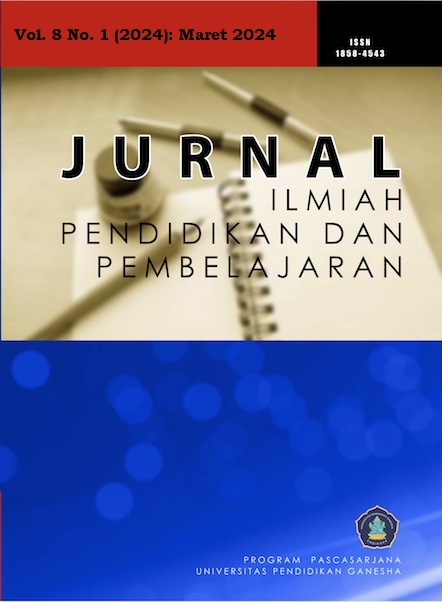CBSA Approach in Learning Indonesian Language and Literature for Students with Special Needs
DOI:
https://doi.org/10.23887/jipp.v8i1.72646Kata Kunci:
CBSA Aproach, Language Learning, Special Needs StudentsAbstrak
The CBSA (Contextual, Based on Students' Ability) approach is used in learning the Indonesian language and literature for students with special needs. This is a CBSA approach to learning Indonesian Language and Literature for students with special needs. The type of research is qualitative research. This method involves collecting data through interviews, observations, or case studies—an analysis technique using qualitative analysis. The research results show that the CBSA approach emphasizes the context and students' ability to understand and use Indonesian. Teachers who implement this approach pay attention to the diversity of student abilities, including students with learning disorders, communication disorders, or other special educational needs. Teachers use strategies and methods tailored to student's needs and skills so that students can learn effectively. In the CBSA approach, teachers use the context of students' daily lives as a basis for learning. Teachers relate learning material to real situations that are relevant to students. This research concludes that the CBSA approach to learning Indonesian Language and Literature can be applied to students with special needs. This research implies that learning Indonesian Language and Literature can be inclusive, meet the needs of students with special needs, and help them reach their full potential in understanding and appreciating Indonesian language and literature.
Referensi
Apriadi, H. (2021). Video Animasi Matematika Dengan Pendekatan Kontekstual Untuk Meningkatkan Pemahaman Konsep Matematika. JNPM (Jurnal Nasional Pendidikan Matematika), 5(1), 173. https://doi.org/10.33603/jnpm.v5i1.3621.
Bisekwa, E., Njogu, P., & Taye Kufa, O. (2021). Effluent Quality of Wet Process Coffee Processing Factories in Coffee Growing Ecological Zones in Burundi. International Journal of Water and Wastewater Treatment, 7(1), 32–38. https://doi.org/10.16966/2381-5299.176.
Comarú, M. W., Lopes, R. M., Braga, L. A. M., Batista Mota, F., & Galvão, C. (2021). A bibliometric and descriptive analysis of inclusive education in science education. Studies in Science Education, 57(2), 241–263. https://doi.org/10.1080/03057267.2021.1897930.
Heny Asdaningsih, I. S., & Yuli Erviana, V. (2022). Pendidikan Karakter Pada Anak Berkebutuhan Khusus Di Sekolah Inklusi Negeri Wirosaban Forma. Jurnal Inovasi Dan Manajemen Pendidikan, 2(1). https://doi.org/10.12928/Jimp.V1i2.4916.
Holmqvist, M., & Lelinge, B. (2021). Teachers’ collaborative professional development for inclusive education. European Journal of Special Needs Education, 36(5), 819–833. https://doi.org/10.1080/08856257.2020.1842974.
Hu, X., & McGeown, S. (2020). Exploring the relationship between foreign language motivation and achievement among primary school students learning English in China. System, 89(April 2020), 102199.1-10. https://doi.org/10.1016/j.system.2020.102199.
Mudiartana, I. M., Margunayasa, I. G., & Divayana, D. G. H. (2021). How is The Development of Valid and Practical Android-Based Local Wisdom Teaching Materials? Jurnal Ilmiah Sekolah Dasar, 5(3), 403. https://doi.org/10.23887/jisd.v5i3.38176.
Niswariyana, A. K., & Muhdar, S. (2021). Strategi Pembelajaran Keterampilan Berbahasa Berbasis Multiple Intelligences pada Anak Berkebutuhan Khusus. Jurnal Ilmiah Telaah, 6(1), 106–112. https://doi.org/10.31764/telaah.v6i1.3872.
Nuraeni, S., & Kusuma, A. B. (2020). Peningkatan Kemampuan Berpikir Kreatif Dan Disposisi Matematis Siswa Melalui Ctl Dengan Teknik Probing-Prompting Smp Negeri 1 Kembaran. JURNAL SILOGISME : Kajian Ilmu Matematika dan Pembelajarannya, 5(1), 44. https://doi.org/10.24269/silogisme.v5i1.1920.
Paulsrud, D., & Nilholm, C. (2023). Teaching for inclusion–a review of research on the cooperation between regular teachers and special educators in the work with students in need of special support. International Journal of Inclusive Education, 27(4), 541–555. https://doi.org/10.1080/13603116.2020.1846799.
Primayana, K. H., Lasmawan, W. I., & Adnyana, P. B. (2019). Pengaruh Model Pembelajaran Kontekstual Berbasis Lingkungan Terhadap Hasil Belajar IPA Ditinjau Dari Minat Outdoor Pada Siswa Kelas IV. Jurnal Pendidikan Dan Pembelajaran IPA Indonesia, 9(2), 72–79.
Rahmah, Z. A., & Ermawati, I. R. (2021). Pengaruh Model Pembelajaran Contextual Teaching and Learning terhadap Hasil Belajar Matematika Siswa Sekolah Dasar. Jurnal Basicedu, 6(1), 364–371. https://doi.org/10.31004/basicedu.v6i1.1916.
Sambodo, S. (2021). Penerapan model pembelajaran cooperative learning tipe group investigation dan problem based learning terhadap hasil kelajar kognitif materi bulutangkis siswa kelas X SMA Negeri 5 Semarang. Journal of Physical Activity and Sports (JPAS), 2(3), 322–328. https://doi.org/10.53869/jpas.v2i3.98.
Satriaman, K. T., Pujani, N. M., & Sarini, P. (2018). Implementasi pendekatan student centered learning dalam pembelajaran ipa dan relevansinya dengan hasil belajar siswa kelas viii smp negeri 4 singaraja. Jurnal Pendidikan Dan Pembelajaran Sains Indonesia (JPPSI), 1(1), 12–22. https://doi.org/10.23887/jppsi.v1i1.21912.
sugiyono. (2014). metode penelitian kuantitatif, kualitatif dan R & D. afabeta.
Uslan, U., Muhsam, J., Hasyda, S., & Aiman, U. (2021). Implementation of Contextual Teaching and Learning and Authentic Assessments to the Science (IPA) Learning Outcomes of 4th Grade Students of Primary Schools (SD) in Kota Kupang. Journal of Education Research and Evaluation, 5(3), 380–390. https://doi.org/10.23887/jere.v5i3.32338.
Williams-McBean, C. T. (2023). Using school-based assessments to advance the integration of sustainable development competences by capitalising on the practice of teaching to the test. Environmental Education Research, 29(5), 715–732. https://doi.org/10.1080/13504622.2022.2107616.
Yuliawati, Permana, J., & Lasmawan, I. W. (2023). Issues and Problems of Implementing Inclusive Education Policies in Elementary Schools. MIMBAR PGSD Undiksha, 11(2), 184–190. https://doi.org/10.23887/jjpgsd.v11i2.56550.
Unduhan
Diterbitkan
Cara Mengutip
Terbitan
Bagian
Lisensi
Hak Cipta (c) 2023 Weda Rukmana Gede

Artikel ini berlisensiCreative Commons Attribution-ShareAlike 4.0 International License.
Authors who publish with the Jurnal Ilmiah Pendidikan dan Pembelajaran (JIPP) agree to the following terms:
- Authors retain copyright and grant the journal the right of first publication with the work simultaneously licensed under a Creative Commons Attribution License (CC BY-SA 4.0) that allows others to share the work with an acknowledgment of the work's authorship and initial publication in this journal.
- Authors are able to enter into separate, additional contractual arrangements for the non-exclusive distribution of the journal's published version of the work (e.g., post it to an institutional repository or publish it in a book), with an acknowledgment of its initial publication in this journal.
- Authors are permitted and encouraged to post their work online (e.g., in institutional repositories or on their website) prior to and during the submission process, as it can lead to productive exchanges, as well as earlier and greater citation of published work. (See The Effect of Open Access)










